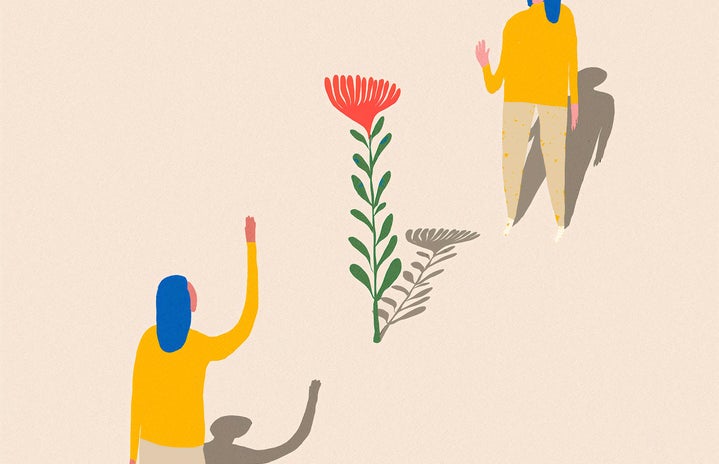As we reach the one-year anniversary of COVID-19 being announced a global pandemic, I am starting to miss my life from last year. Not only the times before WHO’s declaration, where we all naively proceeded with our routines as normal, but for some reason, I am reminiscing the beginning stages of quarantine. If you ask me to pinpoint exactly why, I cannot really say; I did not do Tik Tok dances, make whipped coffee or bake sourdough and the other copious trends of this period. I was not exactly fond of the Chloe Ting workouts or the cringe-worthy celebrity montages. March and April of 2020 was a liminal space between the normalcy of pre-virus living and the dystopian conditions that followed. It was devastating watching death-rates rise, but at the same time there existed the hope that we would “flatten the curve” in due time. And the more I analyze why I am increasingly nostalgic, the less answers I arrive to.

In Jean Baudrillard’s essay “The Precision of Simulacra,” he describes nostalgia as when “the real no longer is what it used to be, nostalgia assumes its full meaning. There is a proliferation of myths of origin and signs of reality: of secondhand truth, objectivity, and authenticity.” The distance that is created throughout time from one point to another allows our minds to manifest our own versions of what truly happened. Not only do our specific recollections of events become blurred as time progresses, but we, ourselves, can exercise a certain amount of agency in choosing what to remember. This often leads to our remembrances either proliferating the good or bad of certain moments –– offering a very black or white portrait of our own lives.
Whether this is a general human inclination or personal to me –– I do not know –– but I find that I often take stock in the good. I would rather filter my life through rose coloured lenses than have to mediate all the more troubling instances of my past. Perhaps this is an evolutionary trait: in order to merely survive, we cannot distract ourselves with difficult memories. It is easier and more efficient to proceed with our daily lives without the burden of past hardships. In the COVID era, however, when our routines become more repetitive and monolithic, I have been ravaging through my memories. That is, I find myself comforted when thinking about the past –– in general. I believe this precisely corresponds to Baudrillard’s estimation, as “the real no longer is what it used to be.” My education is no longer in a classroom, but in my bedroom. Everyday I have to cope with the fact that I might contract a deadly virus if I accidentally stand too close to someone in the grocery store. The government is controlling the amount of people who visit my home. The real –– my life, and definitely yours too –– is certainly not what it used to be. Thus, “nostalgia assumes its full meaning” and the inclination to live our own memories emerges.

Nostalgia, in our current day-and-age, has a positive connotation. The term arguably conjures feelings of warmth, sentiment and joy; this was not always the case. According to Julie Beck for The Atlantic, Swiss physician Johannes Hofer conceived of nostalgia as a mental illness in his 1699 medical dissertation. Explaining the diagnosis, Beck writes “the disease was similar to paranoia, except the sufferer was manic with longing, not perceived persecution, and similar to melancholy, except specific to an object or place.” Despite pathologizing nostalgia to be a bit extreme, it is undoubtedly true that yearning for happier times can cause present-day sadness. Especially while living in a seemingly never ending pandemic, this fixation can become even more pronounced as it feels as if exciting opportunities are no longer in sight, which means we must return to the past to regain these sensations. Nostalgia, therefore, only enhances when we not only think of joyful memories, but when we feel like we will not be able to create those kinds of moments again.

This leads me back to my inquiry of my nostalgia for March and April of 2020. Upon my exploration into the theory of nostalgia, I think I have come to the realization as to why. Although this time was globally marked by anxiety, dread and elements of the surreal, it is easier to frame my recollection of this period more fondly. Rather than remember nights watching the news networks fret over the death tolls, I can instead recall petting my dog and trying out new recipes while viewing the TV. Instead of being sad that my first year at Queen’s was cut short and had to subsequently leave my friends, I can remember getting to do lectures from bed. I can celebrate the fact that I gained so much more free time, at the expense of everything being closed under new lockdown conditions. What I mean by this is not that our personal memories should override objective knowledge of an event that has been more fatal than heartwarming on every level, but that looking at our past inherently, in Baudrillardian terms, causes a “proliferation of myth.” Sometimes I feel as if my memories become so distant from my current self that acknowledging my past is akin to reading stories from another person. As Joan Didion says “we tell ourselves stories in order to live,” we live and understand our own lives as stories. It is why nostalgia is powerful enough to subsume us, adjust our pasts and reframe our memories. It is because we need these memories as much as we need the agency to control them in times like these.



